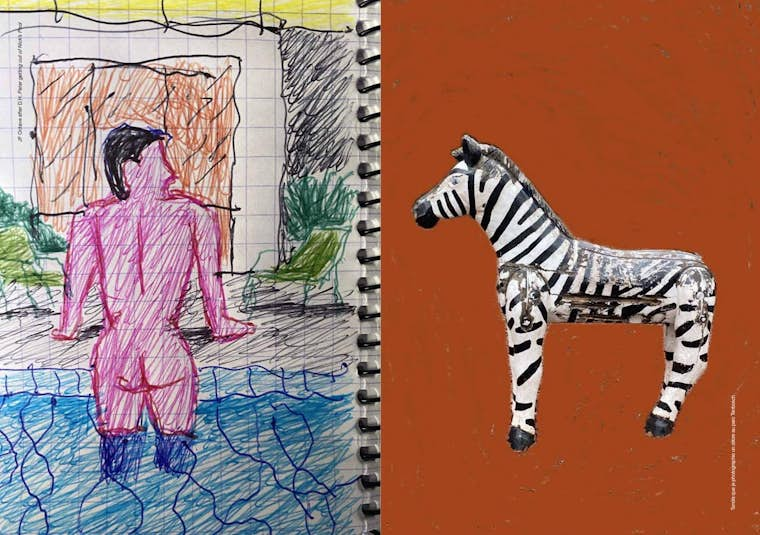Jean-François OctaveUne Vie (ne rien oublier)
New residency at the BPS22: Jean-François Octave’s virtual residency on the museum’s website. For decades, JFO has been a tireless author of fanzines, personal diaries, and other digital diaries, overlapping different influences and techniques. Now he is squatting on the museum's website, presenting his archives and works in progress.
The history of the artistic avant-garde is characterised, among other things, by the desire to shrink the gap between art and life, to the point of conflating them and making an “artistic existence” possible, freed from the need to produce tangible artworks.
Jean-François Octave, let’s call him JFO, didn’t expect it to go so far. He loves it too much, whether it’s sketching, painting, writing, cutting, pasting, or taking photos; just like he loves paper, images, magazines, words and their typefaces, records, K7, films, beautiful designer objects such as trinkets and the memories they hold (or not). Impossible for him to settle for contemplating the world or replicating it. He needs to get close to its elements, bring them together, overlap them, combine them, distort them, scratch and even mix them like a music track if need be.
For JFO, life is a permanent repository that we can draw on rather than deplete, where we can take hold of things rather than be swept away by its tide. Neither is it surprising that early on, the start of the 1970s, the young JFO filled his first diaries with different notes, sketches, small collages, etc. Many actions that constituted the repository of his existence and simultaneously transformed it into a series of beautiful moments, making it bearable. Identifying and transforming to (be able to) exist! Unless identifying is already transformative? Since transforming would be the only condition for existing?
Meanwhile, during his architectural studies at La Cambre in the early 1980s, JFO produced punk-inspired fanzines, naturally! Eternal child of his time, he has always supported the (epi)phenomena of the present moment, whatever they might be. Punk confirmed one of his early intuitions: there is no hierarchy among things; everything is of equal merit; everything is worthy of attention; everything can be connected. So personal anecdotes can be mixed with great history; the stalest pop culture clichés with works of art; the world’s great characters from any historical era with nameless people met while travelling around the globe; personal emotions with abstract reflections; literature with all para-literature; high Style with common writing, etc. As one of the BPS22 collections, the originals of this set of fanzines will soon be scanned and put on the museum’s website.
Over time, the teenage diaries gave way to little spiral-bound notebooks, then more substantial exercise books, overlapping images (paintings, drawings, photos, collages, etc.) and text in which the letters too are first and foremost drawings. Finally, in the mid-1980s, they became A4 sheets, stapled together, ultimately forming a 300-page body of work. Titled Vie & Œuvre, obviously, the set is part of a private Belgian collection that we hope to make available soon on this website.
With graphic technologies developing in the early 1990s, JFO extended his range, benefitting from different software packages and other applications in the endless quest to develop his media. Nowadays, since the start of the 2000s, digital drawings and writings occupy the virtual pages of an electronic diary, for regular weekly publication. To date it amounts to more than 5,000 pages across more than 670 editions, a huge number of trials and errors and several gigabytes of memory. This personal newspaper posts a combination of the artist’s old works and recurring preoccupations. Daniel Vander Gucht, Professor of Sociology (ULB) and creator of La Lettre Volée publications, writes “Part personal diary, part people revelations, and part socio-political and poetic reflection, Jean-François Octave, proponent of appropriation art and fan of Jean-Luc Godard, weaves a narrative at the speed of snapshots to the frontiers of Pop Art, ideas and literature in his combinations of photos, painting and other techniques.”
The 676 editions are now accessible on the BPS22’s website. And because the artist has no intention of stopping, he has been invited to take up a “virtual residence” on the website and can add a new entry to his diary every week. An exceptional occasion to share his work in constant evolution, if not in constant revolution.
In the catalogue "Greatest Hits (2)", published in La Lettre Volée publications, I was already writing in the early 2000s: “ Jean-François Octave’s visual and spatial works emerge as a potential poetical resolution of the inextricable tensions between existential singularity and the contingencies imposed by the outside world. Between autistic withdrawal into oneself and individual dissolution in the apparent dehumanised disorder of the world, the artist always discovers a poetic equilibrium, a way of understanding on the human scale, capable of embracing the monstrous, shapeless expanse of our daily universe. An enthusiastic librarian of his individual existence, he rules his own world with both tenderness and irony and makes our world viable.”
Pierre-Olivier Rollin, Director of the BPS22
